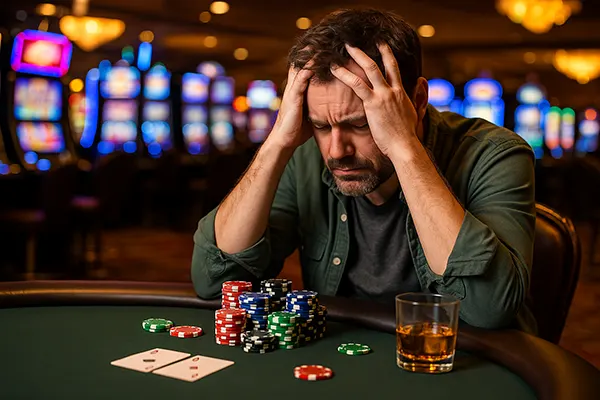
Emotional Dependence on Gambling: Research, Prevention, Real Stories
Emotional dependence on gambling is a growing issue that continues to attract scientific attention in 2025. Researchers, psychologists, and social workers warn that the emotional pull of gambling can lead to addiction, financial difficulties, and personal breakdowns. This article explores the latest research, prevention strategies, and authentic stories of people who have faced and overcome gambling addiction.
Recent Psychological Research on Gambling Addiction (2022–2025)
Over the past three years, studies by institutions such as the University of Cambridge and the National Institute for Health and Care Research (NIHR) have shed light on how emotional dependence forms. Neuroscientific findings confirm that gambling activates the brain’s reward centres in the same way as substance addictions. The dopamine release during risky bets reinforces the desire to repeat the behaviour, creating a psychological loop that can be difficult to break.
In 2024, the British Psychological Society published a report showing that gambling-related emotional attachment often develops in people with pre-existing stress, anxiety, or social isolation. Researchers identified that the urge to gamble is frequently not about the money itself, but the emotional relief that accompanies the act of betting. The sense of anticipation and temporary escape from daily problems often drive players back to the game.
In 2025, international research networks began exploring the link between digital gambling and emotional regulation. Early findings show that people who engage in online betting experience stronger mood swings and a higher risk of emotional burnout than those who gamble in physical venues. The ease of access and anonymity make it harder for users to recognise the severity of their behaviour.
Understanding the Emotional Mechanisms Behind Addiction
Experts explain that emotional dependence on gambling is rooted in the brain’s reinforcement learning processes. Every near-miss or minor win provides a psychological reward, leading the brain to perceive gambling as a way to manage emotions. This creates a false sense of control and safety, which over time replaces real coping mechanisms.
Psychologists stress the importance of recognising early warning signs. Persistent thoughts about gambling, emotional highs followed by guilt, or the need to gamble after stressful events are among the main indicators. Ignoring these signals often results in deeper emotional entrapment and a distorted perception of reality.
Behavioural therapists now use cognitive-behavioural techniques combined with emotional awareness training to treat such dependence. The approach helps individuals identify the feelings that trigger gambling impulses and develop healthier alternatives, such as mindfulness, physical activity, or social engagement.
Real Stories of Recovery and Lessons Learned
Behind the statistics are real people who have fought emotional dependence and rebuilt their lives. One example is a 38-year-old former poker enthusiast from Manchester, who shared his experience in a 2023 NHS podcast. He described how gambling became an emotional refuge during personal crisis, eventually leading to isolation and debt. Therapy and peer support helped him regain balance and self-control.
Another case, published by GambleAware in 2024, tells of a woman who started betting on sports after a divorce. What began as casual entertainment turned into emotional dependency within months. She credits her recovery to professional counselling and self-exclusion tools that blocked her access to gambling websites for a full year.
Such stories highlight an essential truth: recovery requires more than willpower. It demands structured psychological support, understanding from loved ones, and consistent use of preventive tools. Public campaigns across the UK are increasingly focusing on personal stories to promote awareness and empathy among players.
The Role of Family and Society in Healing
Family involvement plays a crucial role in rehabilitation. Studies by the University of Glasgow reveal that people with supportive environments are twice as likely to sustain recovery compared to those facing social isolation. Open dialogue, trust, and the absence of blame create a foundation for healing.
Society’s perception of gambling addiction is also evolving. Once seen as a lack of discipline, it is now recognised as a complex psychological disorder requiring medical and social intervention. Community programmes, support groups, and digital helplines have made assistance more accessible than ever before.
Ultimately, successful recovery stories prove that emotional dependence can be overcome. With professional help, strong social connections, and the right mindset, individuals can regain control over their emotions and rebuild a stable, fulfilling life free from addiction.

Preventive Strategies and Tools for Emotional Self-Control
Preventing gambling addiction begins with self-awareness and education. Understanding how gambling affects emotions is the first step towards responsible behaviour. Many online platforms now offer voluntary deposit limits, time reminders, and self-assessment tests to help users identify risky patterns early on.
The UK Gambling Commission has expanded its collaboration with mental health charities in 2025, launching initiatives that promote emotional literacy among players. The focus is on teaching people to recognise emotional triggers — such as loneliness, stress, or boredom — before they turn into compulsive behaviour. These programmes encourage setting personal goals and maintaining a healthy lifestyle balance.
Digital tools like GamStop, Gamban, and BetBlocker allow players to restrict access to betting websites across all devices. Combined with counselling and mindfulness-based therapy, they form an effective system of emotional self-regulation and relapse prevention. Experts recommend reviewing these measures regularly and combining them with emotional support from trusted friends or family members.
Developing Resilience and Long-Term Emotional Health
Resilience is the cornerstone of addiction prevention. Psychologists emphasise that emotional stability can be trained, just like a muscle. Activities such as regular exercise, creative hobbies, and social volunteering strengthen one’s ability to manage stress without relying on gambling as an outlet.
Maintaining a routine that includes healthy sleep patterns and balanced nutrition contributes to emotional clarity. When the body and mind are in harmony, the temptation to seek relief in risky behaviour decreases. Developing new goals and interests also helps to redirect energy towards constructive pursuits.
Finally, openness about emotional health should no longer be stigmatised. Talking about one’s vulnerabilities and seeking help early are signs of strength, not weakness. The more society encourages honest conversations about emotional dependence, the fewer people will fall into the trap of gambling addiction.
